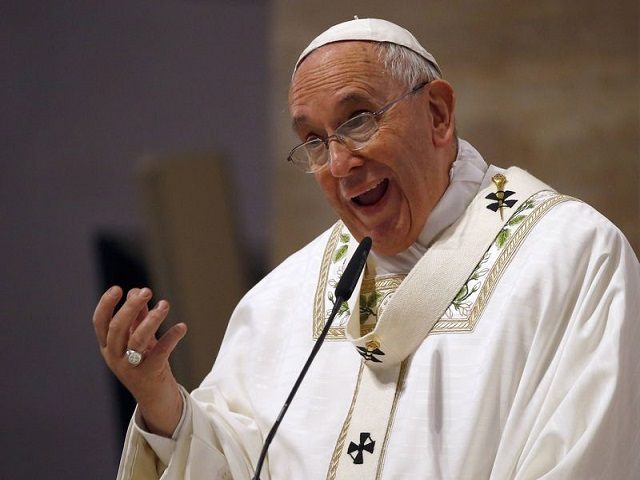Pope Francis, who was revealed as a major collaborator in the dialogues that have led to President Obama yielding major concessions to the communist regime of Raúl Castro in Cuba last December, responded to a question requesting comment on that nation’s human rights crisis by stating that, in some European countries, religious insignia is banned in public places.
The Vatican head of state, returning from a trip to South America in which socialist Bolivian President Evo Morales gifted him a statue of Jesus crucified on a hammer and sickle, addressed the Cuban human rights issue in an extensive interview, the relevant paragraph highlighted by Cuban American Babalú Blog.
The Catholic News Agency bills the interview as one involving “questions ranging from politics, his upcoming trip to the Unites States, and his feelings about taking selfies.” Let the record show that the Pope’s opinion of selfies is unambiguous: “I feel like a grandfather!” On Cuba, however, the Pope made clear he perceives human right violations as a subject worthy of little discussion. Asked by a Fox News reporter, “Should Havana improve its record on human rights, as well as religious freedom?” The Pope answered neither yes nor no, but that Europe should work on expanding religious freedom (emphasis added):
Human rights are for everyone. And human rights are not respected not only in one or two countries. I would say that in many countries of the world human rights are not respected. Many countries in the world … and what will Cuba lose or the U.S. lose? Both will gain something and lose something, because this happens in negotiations. Both will gain, this is sure: peace, meetings, friendship, collaboration. These they will gain … but what will they lose, I cannot imagine. They may be concrete things. But in negotiations one always [both] wins and loses. But returning to human rights, and religious freedom. Just think of the world. There are some countries and also some European countries where you cannot make a sign of religion, for different reasons, and on other continents the same. Yes. Religious liberty is not present in all the world, there are many place that do not have it.
As for that hammer and sickle Jesus: “I understand this work. For me it wasn’t an offense, but I had to do this hermeneutic, and I say it to you so that there aren’t any wrong opinions.”
Regarding Europe, Pope Francis appears to be referring to France, where the national government has instituted a ban on wearing religious paraphernalia in schools, including the Muslim hijab and burqa. That law has been upheld by the European Court of Human Rights, and its implementation has had little, if anything, to do with the Catholic Church.
The religious freedom violations in Cuba, in contrast, have been directly encouraged–if not performed outright–by Catholic officials. On top of the list of victims is a group called the Damas de Blanco, or Ladies in White, comprised of mothers, daughters, sisters, and wives of political prisoners. The group, consisting of mostly Catholic members, has attended Sunday Mass in white garb for years as a peaceful state of dissidence against communism. Every Sunday, for years, Cuban government officials have rounded them up and had them arrested as they walked out of church. These arrests increased in number significantly since President Obama’s concessions to Castro in December.
In addition to arrests, Ladies in White and their supporters are routinely beaten, tarred, and insulted by crowds created by the communist regime to dissuade them.
In late June, a Catholic priest banned these women from attending Mass in white entirely. The ban followed a statement from Catholic Cardinal Jaime Ortega that there are no political prisoners in Cuba. “It has been a while since there have been any,” he stated in an interview, claiming most were released during the visit of Pope Benedict XVI. Former political prisoners, now openly activists, condemned the statements as a “betrayal” of the Cuban people, particularly the Ladies in White, whose mere existence proves Ortega’s statements false. Ortega has since said to those criticizing his untruthful statement, “If there are any, perfect, but let us know.” He added that those in prison are there for “economic” crimes.
The Ladies in White have formally requested an audience with Pope Francis upon his arrival to the island later this year. Given that his Cardinal in Cuba refuses to acknowledge their relatives’ existence, it is unlikely the Vatican will respond favorably.

COMMENTS
Please let us know if you're having issues with commenting.